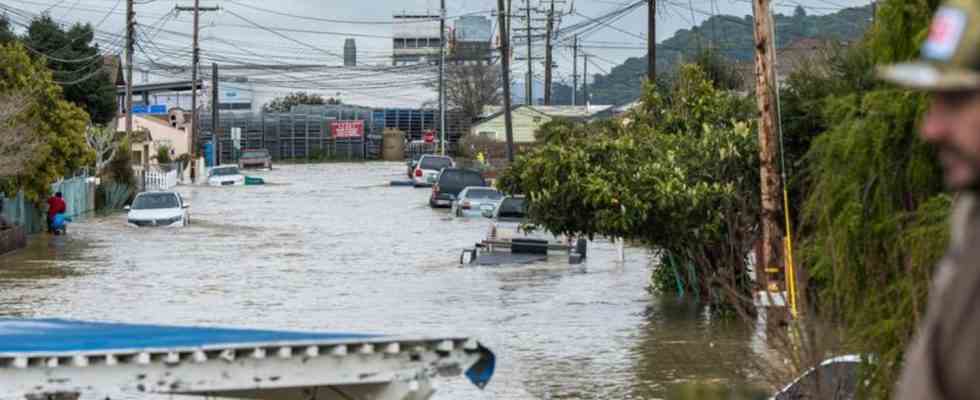IPCC
Intergovernmental Panel on Climate Change presents final report on climate catastrophe
Floods in Watsonville, California. Climate science has been warning for years: “It’s 5 to 12.” photo
© Nic Coury/AP/dpa
It is the mother of all climate negotiation bases: On this basis, the countries of the world should agree on stronger measures as quickly as possible – and above all implement them.
After a tough struggle, the Intergovernmental Panel on Climate Change agreed on its synthesis report on climate change on Sunday. More than 600 representatives from science and politics have discussed the document line by line since last Monday. The deliberations should have ended on Friday, but lasted until Sunday evening. The report will be presented today in Interlaken, Switzerland.
This synthesis report is one of the foundations for the coming climate negotiations, so governments have a clear interest in what they want to see emphasized in it and what not. It is the final document of the 6th Assessment Cycle of the Intergovernmental Panel on Climate Change (IPCC). Six individual reports have been published in the cycle since 2018. It should summarize all findings and present them in a pointed manner. The next IPCC reports are expected in five to seven years.
The key messages are already clear: climate change is progressing faster than expected and the current climate protection measures are far from sufficient to limit warming to 1.5 or at least less than 2 degrees above the pre-industrial level.
“An extremely difficult cooperation problem”
Poorer countries need much more financial support to avoid climate-damaging emissions and prepare for the already sharply increased risks of drought, heat waves and floods.
“What it says is scientifically established, that is no longer questioned,” said Jochem Marotzke, director at the Max Planck Institute for Meteorology in Hamburg, the German Press Agency. “What is made of it is another question.” Marotzke has contributed to several reports by the Intergovernmental Panel on Climate Change, but is not involved in this report.
According to his own statements, he is pessimistic that the governments are now doing what is urgently needed: massively reduce emissions as quickly as possible. “The attitude is often: why should I try hard when others don’t?” But that is fatal. “This is an extremely difficult cooperation problem.”
The Intergovernmental Panel on Climate Change (IPCC) is an intergovernmental body with representatives from the 195 member countries. He commissions science to compile all findings on climate change about every seven years. The next cycle begins in summer.

